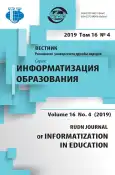Development of ICT competence among students when teaching inverse problems for differential equations with the use of computer technology
- Autores: Kornilov V.S.1
-
Afiliações:
- Moscow City University
- Edição: Volume 16, Nº 4 (2019)
- Páginas: 328-337
- Seção: ELECTRONIC LEARNING SUPPORT TOOLS
- URL: https://journal-vniispk.ru/2312-8631/article/view/333512
- DOI: https://doi.org/10.22363/2312-8631-2019-16-4-328-337
- ID: 333512
Citar
Texto integral
Sobre autores
Viktor Kornilov
Moscow City University
Autor responsável pela correspondência
Email: vs_kornilov@mail.ru
Bibliografia
- Belenkova I.V. Metodika ispol’zovanija matematicheskih paketov v professional’noj podgotovke studentov vuza [Method of using mathematical packages in professional training of university students]: dissertation of the candidate of pedagogical sciences. Ekaterinburg, 2004. 170 p.
- Bidaibekov E.S., Kornilov V.S., Kamalova G.B. Obuchenie budushhih uchitelej matematiki i informatiki obratnym zadacham dlja differencial’nyh uravnenij [The training of future teachers of mathematics and informatics inverse problems for differential equations]. Vestnik Moskovskogo gorodskogo pedagogicheskogo universiteta. Seriya: Informatika i informatizacija obrazovanija [Bulletin of the Moscow City Pedagogical University. Series: Informatics and Informatization of Education]. 2014. No. 3(29). Pp. 57–69.
- Buzhinskaya N.V. Metodika ocenki urovnja IKT-kompetentnosti studentov pedagogicheskih vuzov [Methodology for assessing the level of ICT competence of students of pedagogical universities]. Vestnik Brjanskogo gosudarstvennogo universiteta [Bulletin of the Bryansk State University]. 2016. No. 1(27). Pp. 319–324.
- Boronenko T.A., Fedotova V.S. Formirovanie IKT-kompetentnosti nauchno-pedagogicheskih kadrov v trehurovnevoj sisteme vysshego obrazovanija [Formation of ICT competence of scientific and pedagogical personnel in the three-level system of higher education]. Obrazovanie i nauka [Education and science]. 2016. No. 1. Pp. 95–106.
- Vatulyan A.O., Belyak O.A., Sukhov D.Yu., Yavruyan O.V. Obratnye i nekorrektnye zadachi [Inverse and ill-posed problems]: textbook. Rostov-on-Don: Southern Federal University Publ., 2011. 232 p.
- Denisov A.M. Vvedenie v teoriju obratnyh zadach [Introduction to the theory of inverse problems]: textbook. Moscow: Izd-vo Moskovskogo universiteta, 1994. 207 p.
- Efimova T.N. Formirovanie informacionno-kommunikativnoj kompetentnosti kak neobhodimoe uslovie jeffektivnosti professional’noj dejatel’nosti budushhego specialist [Formation of information and communication competence as a necessary condition for the eff of professional activity of the future specialist]. http://migha.ru/formirovanieinformacionno-kommunikativnoj-kompetentnosti.html (accessed: 31.07.2019).
- Kabanikhin S.I. Obratnye i nekorrektnye zadachi [Inverse and ill-posed problems]: a textbook for university students. Novosibirsk: Sibirskoe nauchnoe izdatel’stvo, 2009. 458 p.
- Kiseleva T.G., Kartseva S.S. Model formirovanija IKT-kompetencii u studentov pedagogicheskih special’nostej [Model of ICT competence formation in students of pedagogical specialties]. Za kachestvennoe obrazovanie [For quality education]: proceedings of III All-Russian forum (with international participation). Saratov: SGMU, 2018. http:// filling-form.ru/other/121775/index.html?page=25 (accessed: 31.07.2019).
- Kornilov V.S. Realizacija didakticheskih principov obuchenija pri ispol’zovanii obrazovatel’nyh jelektronnyh resursov v kurse “Obratnye zadachi dlja differencial’nyh uravnenij” [Implementation of didactic principles of teaching using educational electronic resources in the course “Inverse problems for differential equations”]. Vestnik Rossijskogo universiteta druzhby narodov. Seriya: Informatizacija obrazovanija [Bulletin of Peoples’ Friendship University of Russia. Series: Informatization in Education]. 2006. No. 1(3). Pp. 40–44.
- Kornilov V.S. Obratnye zadachi v soderzhanii obucheniya prikladnoj matematike [Inverse problems in the content of teaching applied mathematics]. Vestnik Rossijskogo universiteta druzhby narodov. Seriya: Informatizacija obrazovanija [Bulletin of Peoples’ Friendship University of Russia. Series: Informatization in Education]. 2014. No. 2. Pp. 109–118.
- Kornilov V.S. Obuchenie studentov obratnym zadacham dlja differencial’nyh uravnenij kak faktor formirovanija kompetentnosti v oblasti prikladnoj matematiki [Teaching students inverse problems for differential equations as a factor of competence formation in the field of applied mathematics]. Vestnik Rossijskogo universiteta druzhby narodov. Seriya: Informatizacija obrazovanija [Bulletin of Peoples’ Friendship University of Russia. Series: Informatization in Education]. 2015. No. 1. Pp. 63–72.
- Kornilov V.S. Realizacija nauchno-obrazovatel’nogo potenciala obuchenija studentov vuzov obratnym zadacham dlja differencial’nyh uravnenij [Realization of scientific and educational potential of training of students of higher education institutions in the inverse problems for the differential equations]. Kazanskij pedagogicheskij zhurnal [Kazan pedagogical journal]. 2016. No. 6. Pp. 55–59.
- Kornilov V.S. Teorija i metodika obuchenija obratnym zadacham dlja differencial’nyh uravnenij [Theory and technique of training to the inverse problems for differential equations]: monography. Moscow: OntoPrint Publ., 2017. 500 p.
- Kornilov V.S., Karymsakova A.J. Informatizacija obuchenija budushhih uchitelej matematiki linejnoj algebre kak faktor razvitija IKT-kompetentnosti [Informatization of training of future teachers of mathematics in linear algebra as a factor of ICT competence development]. Vestnik Moskovskogo gorodskogo pedagogicheskogo universiteta. Seriya: Informatika i informatizacija obrazovanija [Bulletin of the Moscow City Pedagogical University. Series: Informatics and Informatization of Education]. 2019. No. 3(49). Pp. 69–79.
- Nesterova I.A. IKT-kompetentnost [ICT competence]. http://odiplom.ru/lab/ikt-kompetentnost.html (accessed: 31.07.2019).
- Romanov V.G. Obratnye zadachi dlja differencial’nyh uravnenij [Inverse problems for diff ential equations]: special course for NGU students. Novosibirsk: NGU, 1973. 252 p.
- Sabitova N.G. Formirovanie informacionno-kommunikacionnyh kompetencij studentov bakalavriata sredstvami jelektronnyh obrazovatel’nyh tehnologij [Formation of information and communication competences of undergraduate students by means of electronic educational technologies]: dissertation of the candidate of pedagogical sciences. Izhevsk, 2012. 200 p.
- Yurko V.A. Vvedenie v teoriyu obratnyh spektral’nyh zadach [Introduction to the theory of inverse spectral problems]: textbook. Moscow: Fizmatlit Publ., 2007. 384 p.
- Bidaibekov Y.Y., Kornilov V.S., Kamalova G.B., Akimzhan N.Sh. Fundamentalization of knowledge system on applied mathematics in teaching students of inverse problems for differential equations. AIP Conference Proceedings (Antalya, Turkey, November 5–7, 2015). 2015. Vol. 1676. No. 1. https://doi.org/10.1063/1.4930470
Arquivos suplementares









